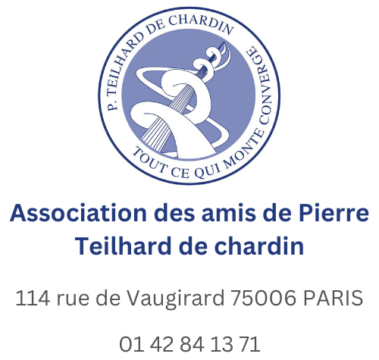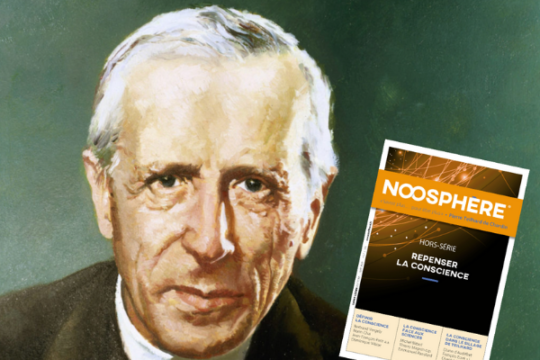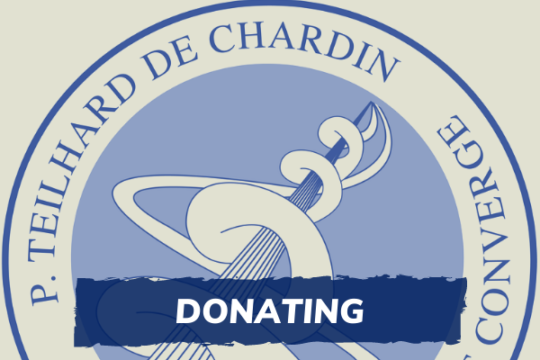These extracts, where Teilhard approaches the theme of death with his correspondents, were gathered in homage to the deceased, so numerous in this period of confinement, and especially for Jean-Jacques HOURTON, animator of the Group of reading of Meudon-Sèvres-Chaville, deceased this morning.
Let us pray for them, with Teilhard: “O energy of my Lord, irresistible and living force, because, of us both, You are the strongest infinitely, it is to You that belongs the role to burn me in the union that must melt us together. Give me something even more precious than the grace for which all your faithful pray. It’s not enough that I die in communion. Teach me to take communion as I die.” [
The Divine Environment
, p. 96]
Letter of Pierre Teilhard de Chardin to Marguerite Teillard-Chambon, of Vauciennes, July 12, 1918.
[…] The insufficiency that I discover in Nature, – almost to the point of suffering physically, – is rather the irremediable superficiality of the experience that we have here below. Everything new that we manage to discover or extract is included in a zone limited in advance by our faculties. As soon as we reach a certain depth, we find the rock; we come up against an impassable circle, which can only be crossed by a complete organic reorganization, such as only death can bring. Nature makes us want to die in order to finally see what is in it – (dying from death which is the term of the providentiallymatured life, one must say to remain in the healthy line of the reason and the experience) : here is, it seems to me, the last development of the emotion undergone in front of the things. I found, with some surprise, this feeling expressed by Baudelaire, somewhere in Les Fleurs du Mal (a little distorted by dilettantism and pessimism, of course) : To die to reach, finally, the new. [Genesis of a thought – Letters (1914-1919), Grasset, 1961, p. 277-278]
Letter from Pierre Teilhard de Chardin to Léontine Zanta, from Tsien Tsin, December 12, 1923.
… like you, I would be inclined to hesitate about what will remain of our consciousness after death. But I have seen and experienced that there is no coherent life except in the overflowing faith in a Universe whose whole movement solicits us to a supreme Union. From then on, I can only think of living and realizing this faith. To satisfy her, I fiercely believe in some progress, and I hold the deniers as evil heretics. And, to calm me down on the troubling ” beyond “, I close my eyes in the arms of the taller one who drags me. I do not think that this one has anything to fear from the Energy that leads the World, that will have always made profession to entrust itself to Her. We will be, on the other hand, something very new. But it will certainly be us again, only better. [Letters to Léontine Zanta, Desclée de Brouwer, 1965, p. 66]
Letter from Pierre Teilhard de Chardin to Auguste Valensin, from Paris, May 1920.
[…] In scholasticism, we are wrong to consider the ” potentia (power) ” as ” a core ” of ” consistency”, of ” substantiality ” in the beings. […] I think we have to think of things the other way around. The matter, relatively to the psyche, – the power, relatively to the act, _ it is not what ” supports ” (= ” the core “), but ” what is supported “, and ” what undergoes “. The soul cannot be created outsidea World, because it can only existby acting on a subject of action to its measure (this action consisting in unifying around it a Universe which, without it, would fall back into plurality). It is not created with pre-existing matter or life, but on this life and this matter, – in such a way that, with this life and this matter, it forms the same organic Whole, ” hierarchical”, – the superior and inferior elements not being confused, but conditioning each other, – the superior supporting the inferior (because more ” a “), and the lower providing the superior with something to unleash its unifying power (act). This amounts to saying that there is a kind of continuum ” metaphysical “, that is to say a complex, hierarchical sequence of even the most spiritual Essences. – In this conception, the elements of a thing said to be composed are not the constituents of this thing, but its appropriate underlings (of an essential” underlining “, moreover, since the monads exist only in ” chain “, in ” series “, in ” universe “). When an animal dies, it is not its material elements that dissociate: it is its soul that becomes incapable of unifying them any longer. – In the case of the man, the death represents a metamorphosis by which is rejected an apparent, provisional form of the Universe (provisional and caducous because still bound and mixed to the forms ” animal ” and ” inert ” of unification of the Universe), but it is only metamorphosis. The soul ” separated ” continues to exist onlyas a unifier of the Universe, – but in a new way (and which will be fully actuated only at the Resurrection). There are not, strictly speaking, separate souls: there are only souls that change ” sphere ” in the World where everything is held. – This concept of the inferior playing the role of “the superior” in relation to the superior is a very important one. element-supported “It seems interesting to me not only to understand the situation of the spirit in matter, but also to define our attitude towards N.S.: N.S. needs us without our union adding anything to it, because our function is to undergo, to be a subject to its action. I would no longer say, as in the past, ” Plus esse est plus, et a pluribus, uniri ” – but ” plus esse est plus, et plura, unire “*. […]
Very friendly in X. Teilhard [Lettres intimes, Aubier Montaigne, 1974, p. 59-60]
* ” To be more is to be better united with a greater number of elements “, – but ” To be more is to better unite a greater number of elements. ” Teilhard opposes here a subdued evolution to an active evolution, two opposite forms that he thinks complementary. See T. VII, p. 120 and T. IX, p. 73) […]
www.teilhard.fr






